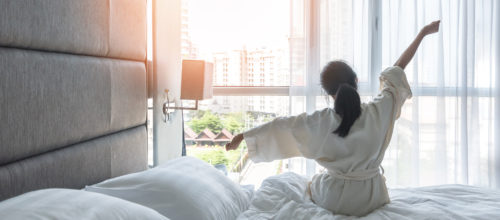
Sleep and Immunity: Tips for Better Sleep Habits
Sleep is an essential part of our well-being. It plays an important role in healing, muscle recovery, and memory. While more sleep won’t necessarily prevent you from getting sick, sleep loss could adversely affect your immune system. Proteins that target infection and inflammation are both produced and released during sleep. Getting the recommended amount of sleep each night will help keep your immune system strong and also protect you from other health issues including heart disease, diabetes, and obesity.
It is recommended that adults get seven to eight hours of sleep a night. School-aged children and teenagers need eight to 11 hours. Regardless of age, everyone should get a minimum of seven or more hours of sleep each night.
Good sleep hygiene, the practice of healthy behaviors you can do to affect your sleep routine, can help you get the sleep you need.
Try these sleep hygiene tips to improve the quality of your sleep.
DURING THE DAY
1. Do more physical activity
Staying active helps in getting restful sleep. As we previously discussed, try to get 150 minutes of moderate exercise each week. A physical therapist can help you find the right exercises for your needs and abilities.
2. Increase your exposure to light
Lack of vitamin D is linked to a higher risk of sleep disorders. Consider increasing your exposure to light by getting outside during the day: go for walks, garden, ride bikes, etc.
3. Avoid long napping
Limit your naps to 20 minutes or less and try to avoid napping after 4:00pm so as not to interfere with your nighttime sleeping schedule.
4. Limit alcohol use
Alcohol causes sleep disturbance, especially in the second half of the night. It reduces rapid eye movement (REM) sleep, which may cause daytime drowsiness and poor concentration. The more you drink before bed, the more pronounced these effects.
5. Avoid caffeine after midday
Caffeine is a stimulant, which will make it hard for you to fall asleep and stay asleep, especially if consumed closer to bedtime.
BEFORE BED
6. Give yourself time to get enough sleep
Set a bedtime that will allow seven or more hours of sleep.
7. Keep a sleep schedule
Wake up and go to bed at the same time every day to establish a good sleep routine.
8. Set the temperature
According to the National Sleep Foundation, setting your room to around 65 degrees makes for the best sleep. Assure that the temperature is good for you and you have the necessary blankets and pillows for your comfort.
9. Limit screen time within 1 hour of bedtime
Checking your phone stimulates the brain, causing you to become more active and awake. In addition, exposure to blue light from screens reduces melatonin, which can affect your circadian rhythm.
10. Create a relaxing bedtime routine.
This may include dimming the lights and reducing noises. Using meditation or soft relaxing sounds can help prepare you for sleep.
Sources:
https://www.choosept.com/resources/detail/10-habits-better-sleep
https://www.sleepfoundation.org/articles/how-sleep-affects-your-immunity
https://www.webmd.com/sleep-disorders/news/20130118/alcohol-sleep#1
